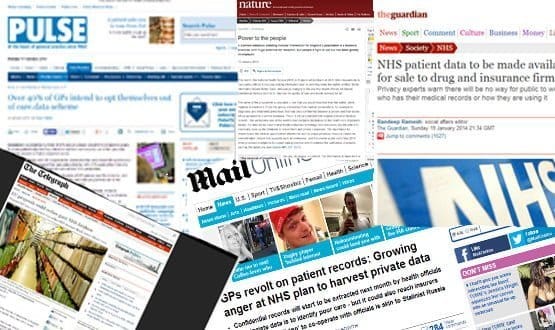Care.data: a media.disaster
- 17 February 2014

When EHI reported that well-known privacy campaigner Phil Booth had “slammed” the leaflet that it was sending out about care.data, NHS England was very upset.
One of its press team contacted the newsdesk to complain that the story failed to adequately explain the benefits of the programme to expand the Hospital Episode Statistics and to link them to other datasets (previous stories had tracked its development, pros and cons in considerable detail).
The ‘media relations manager’ was also unhappy that the head of MedConfidential had been given space to compare the leaflet to “junk mail” – because it was going out unaddressed to every household in England – and to complain that it did not contain an opt-out form.
If NHS England has been sending similar emails to every organisation that has reported on care.data since then, its press team will have been extremely busy.
Over the past couple of weeks, the number of articles, think-pieces and slots on satirical radio programmes about care.data have exploded; and “slammed” has been one of the milder words in their headlines.
The Mail Online described Gordon Gancz, who has decided to opt-out all his Oxford patients from care.data unless they decide to opt-in, as the “hero GP” who “won’t give in to the NHS Thought Police.”
Data for sale?
The Mail’s tone doesn’t quite capture the nature of most of the care.data coverage, which, initially at least, was pretty balanced; if undeniably more focused on reporting concerns than on tub-thumping for the project. However, it certainly captures the nature of the public reaction.
Both the Mail and the Guardian have received huge responses to their coverage of care.data, with comments running well past the 1,000 mark on almost every item they have published.
Many of these responses, it has to be said, have focused on the idea that drug and insurance companies will be able to buy care.data information – either because this was the initial focus of much of the newspaper coverage, or because people just don’t trust the present government not to do it.
So, in the middle of January, the Guardian ran a story claiming “NHS patient data to be made available for sale to drug and insurance firms” that picked up 1,500 responses of pure outrage.
“Figuring out the price list for when they flog the NHS, eh?” was just one early comment posted. “Yeah. All part of the labelling for the on-going sell-off of ourselves” was one of the first responses to that.
NHS England and the Health and Social Care Information Centre, which will operate the 'secure safe haven' that will host care.data, have both said this will not happen. Indeed, Dr Geraint Lewis, the former public health doctor leading the scheme, has said he wants to let researchers have information at cost – or possibly £1.
Still, the HSCIC’s initial documentation for care.data did suggest that insurers might be one class of organisation that could benefit. Not charging them for the information they might need “to set fair premiums” is unlikely to make those who object to the idea feel better about it.
Alice Bell, also writing in the Guardian about “why you should be angry about care.data”, argued the project “redefines what it means to be a patient” by turning health service users into economic units; so opting out should be seen as a “democratic” act.
Traffic light confusion
Care.data will handle of three types of data – identifiable data extracted from hospitals, GP systems and other sources; pseudonymised data, in which some identifiers are replaced by placeholders, which will be made available to researchers and others; and anonymised data, or very large datasets, which will be published.
The HSCIC calls these ‘red’, ‘amber’ and ‘green’ data respectively. Its present problems would not have arisen if it had decided not to collect the ‘red’ data – by ‘pseudonymising at source’, as many GPs want – or if it had tried to get patient consent for specific users – which the EU wants, but the government has dismissed as “impractical.”
The second round of press coverage focused on the ‘amber’ data, and whether the pseudonymisation will work; or whether it will be possible, in fact, to re-identify patients from this information.
A strong editorial in the well-respected journal Nature argued that the care.data leaflet completely downplayed the risks of this happening, describing psydonymisation as “far from foolproof” and open to what are commonly called “jigsaw attacks”, in which data from different datasets is recombined to identify individuals.
In “overly reassuring the population that its personal data are safe is an open invitation to public disillusionment with the system down the road,” it added in a piece that started by saying the project had “huge potential” and should be supported in principle.
Concerns about re-identification, and disgust with the publicity campaign, go to the heart of GP concerns about the programme, according to a much-reported survey by Pulse.
In one of many stories that have attracted the ire of national director of patients and information Tim Kelsey on Twitter, the GP magazine reported at the end of January that 41% of 400 readers who took part in a snapshot survey intended to opt out of care.data, with another 16% undecided.
The Daily Mail followed up by finding a full-on “GP revolt on patient records” in which, the paper said, “growing numbers of GPs” were willing to not only opt-out of care.data themselves, but opt-out their patients.
Admittedly, it could only point to “at least four” GPs “defying orders to hand over their patients records”, including Dr Gancz. But the hundreds of readers who commented on the story were right with him. “KEEP UP THE GOOD WORK DOCTOR GORDON,” one wrote, capitals on lock.
Police aware
A more recent run of stories have, in effect, turned attention back on the ‘red’ data, by reporting that the police could make use of care.data information.
The Guardian, yet again, was one of the first to make the running on this, claiming that “police will have ‘backdoor’ access to health records” even if people opt-out.
This rather confused story, apparently based on an interview with David Davis MP, the Tory shadow-home secretary turned privacy campaigner, claimed “the police will be able to request information from a central database without a warrant.”
NHS England issued a statement denying this, saying that if the police wanted a GP’s records, they would have to go to practices and use the Regulation of Investigatory Powers Act, as they do at present.
However, the HSCIC has acknowledged that the identifiable data in care.data will be passed on under requests made under ‘civil emergencies legislation’ (presumably RIPA) and ‘section 251 orders’ from the health secretary.
So, if patients have not opted-out of having their data uploaded to the system, or they have only opted out of having it shared in pseudonymised form, it would appear that elements of the story are correct.
Correct or not, it has done nothing to damp-down with rising opposition to the project, with early comments under the story saying: “police state, much?” and again: “It is really important to opt-out of this latest attempt to monetise our private medical histories.”
Data is good for you
NHS England has, belatedly, tried to make a better public case for care.data, getting behind a campaign from the Wellcome Trust and other medical charities that support the project.
Jonathan Freedland argued that it could have been used to more easily prove or disprove the links between Thalidomide and birth defects, MRSA and autism, and smoking and cancer in yet another Guardian column, which argued that the Snowden revelations about government spying had poisoned the debate.
Dr Clare Gerada, the immediate past chair of the Royal College of General Practitioners, has also been out making the link between Thalidomide and birth defects.
However, this seems a poor case to pick, given the well-known failure of testing and regulation that lay behind the scandal, which the US largely avoided, thanks to the FDA’s refusal to license the drug for general sale in the face of huge drug company pressure.
Meanwhile, any number of media outlets have followed Nature’s line that while there is a great case to be made for care.data, NHS England and the HSCIC have seemed reluctant to publicise it and that the belated communications campaign has been terrible.
Wired.co.uk weighed into the debate by saying that “the communication of care.data to patients has been an absolute shambles”, while the New Statesman attempted to back the project by saying “care.data is crucial.” Unfortunately, it went on to add, that “government incompetence risks undermining the project.”
Rights, wrongs, disastrous PR
When the care.data leaflet first went out, NHS England’s media relations manager insisted that it had assurances from Royal Mail that unaddressed mail was picked up just as often as other kinds of mail shot.
She also said it would be “inappropriate” to include an opt-out form because patients had to contact their GP as the data-controller for the first information to be extracted, and that other helplines and websites were available to explain the opt-out process.
Yet EHI readers and others have now either not received leaflets, or found them tucked into pizza and furniture leaflets. NHS England said over the weekend that it is now talking to the Royal Mail about the reported problems.
Meanwhile, Kelsey admitted on the Today programme recently that “I think that maybe we haven’t been clear enough about the opt-out, I agree with that” – an admission that the Register reported with some glee.
MP Roger Godsiff has since issued a formal complaint to the Information Commissioner’s Office about the leaflet drop; asking the ICO – which has been sounding increasingly unhappy – to decide whether it really constitutes informed consent.
If the ICO wants to decide otherwise, then it will certainly have gained ammunition from another slew of polls that emerged this weekend.
One YouGov poll for consumer group SumOfUs found that 65% of respondents “oppose the sale of their medical history.” An ICM Research poll, reported by the BBC, found that only 29% of the 860 people contacted recalled getting a leaflet, and 45% were unaware of the scheme.
And a further YouGov poll for the Medical Protection Society said that 77% of GPs do not feel NHS England has given them the information they need to help patients make an informed choice.
This alone will keep the row running, push care.data proponents even further onto the back-foot and, by the look of it, make heroes of some very unlikely family doctors.




